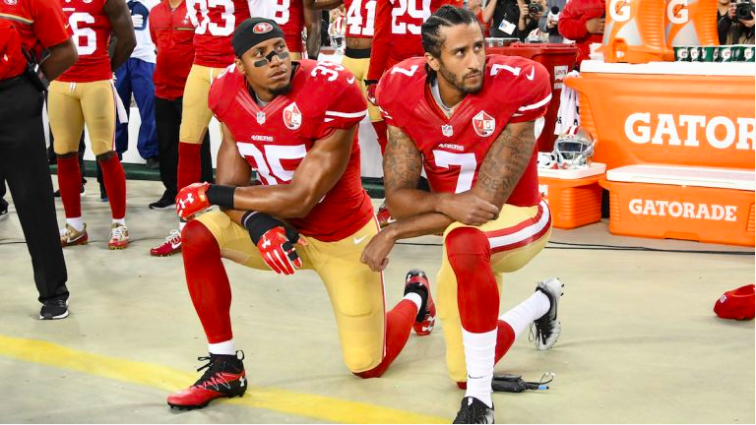“I cannot stand and sing the anthem. I cannot salute the flag; I know that I am a black man in a white world,” Jackie Robinson said.
In 1972, Robinson published his autobiography “I Never Had it Made,” where Robinson revealed that he could never stand and sing the National Anthem as Robinson was a black man in a world that was not made for him.
Robinson broke the color line by playing for the Brooklyn Dodgers and died four days prior to the release of his autobiography at the age of 53.
Now, 46 years later, a new debate has arisen among Americans across the country: should players be forced to stand for the national anthem?
On May 23, the decision was made for football players by a vote by the owners of NFL teams.
Players will now be forced to stand for the anthem or stay in the locker room.
The new policy from the NFL has drawn comparisons to the NBA’s policy regarding the anthem, which stipulates that teams shall stand during the anthem.
But what some Americans and the owners of NFL and NBA teams fail to realize is that throughout history, people of color have been oppressed by numerous racist policies and unjust instances of police brutality.
A 2015 National Survey on Drug Use and Health found that about 17 million whites and 4 million blacks reported having used an illicit drug within the last month, yet the imprisonment rate for blacks for drug crimes is six times that of whites.
In July 2014, Eric Garner was killed by a police officer in New York after being placed in a chokehold by the officer — an illegal practice in the state of New York.
In 2015, Walter Scott was shot in the back while running away from a police officer.
These are just two out of countless unjustified cases of police brutality that have led to the anthem protest by football players.
The 100:1 sentencing law signed into law in 1986 by President Ronald Reagan established a mandatory minimum of a five-year prison sentence for possession of five grams of crack cocaine. Five hundred grams of powder cocaine would lead to a mandatory minimum of a five-year prison sentence.
Racist housing policies such as redlining and urban renewal and the effects of white flight have devastated black communities that are heavily policed and poor.
Schools in urban areas tend to be underfunded and lack the resources privileged students have that help them succeed.
However, some Americans are unaware of the plight of blacks in America and claim that black communities are suffering due to a collective lack of personal responsibility and laziness.
A survey by the Washington Post in 2016, found some not so surprising results. The poll asked: on average, blacks have worse jobs, income, and housing than white people. Do you think those differences are because most just don’t have the motivation or willpower to pull themselves up out of poverty?
Fifty-five percent of surveyors who identify as Republicans said yes; 26 percent of Democrats said yes as well.
While some may argue that kneeling is more divisive rather than helpful, you must recognize that most Americans felt the same way about Dr. Martin Luther King Jr’s and other civil rights leaders’ protests, boycotts, and marches, yet now we regard Dr. King as a national hero.
In 1963, a Gallup poll found that 60 percent of Americans had an unfavorable view of the March On Washington, claiming they felt it would cause violence and not accomplish anything.
Others who are not in favor of the anthem protest claim that the players like Kaepernick should focus on solutions instead of protesting, yet Kaepernick has for years.
In various cities around America, Kaepernick has hosted his Know Your Rights camps to help teach youth of color about the importance of higher education, eating healthy, and how to have safe interactions with law enforcement.
Kaepernick has also started the Million Dollar Pledge where he encourages celebrities to donate to various charitable organizations.
One might argue that players like Kaepernick have no right to kneel or protest due to the fact that their socioeconomic status excludes them from dealing with racism. That claim is not true.
Kaepernick no matter how much wealth he accumulates will always be black. To the rest of America, he will always be seen as a black man and all the stereotypes that come with being a black man.
In June of 2017, the N-word was sprawled on Cleveland Cavaliers player Lebron James’s gate.
In January of 2018, Milwaukee Bucks player Sterling Brown was arrested and tased without cause in an incident that was caught on tape and led to the suspension of three officers. Again, these are just two out of countless incidents that prove no matter how wealthy you are, you can still deal with racism and bias.
You may not agree with NFL players’ method of voicing their concerns for the racial injustices in America, but if you can not at least understand the issues affecting black Americans today and the racist policies that have led to these issues, then you are part of the problem.


